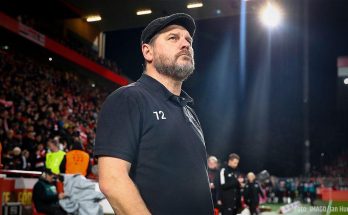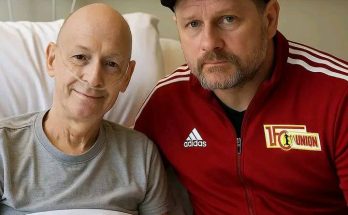Jayden Reed, the talented wide receiver for the Green Bay Packers, suffered a devastating injury during tonight’s game, breaking his collarbone and leaving the team without one of their most dynamic offensive weapons. The news was confirmed shortly after the incident, sending shockwaves through the Packers’ locker room, fan base, and the broader NFL community. Reed, known for his speed, route-running precision, and ability to make contested catches, has been a vital part of Green Bay’s offensive strategy since his arrival. His injury not only raises questions about the immediate performance of the team but also has broader implications for the Packers’ offensive game plan, roster decisions, and prospects for the remainder of the season.
The moment of injury occurred during a routine play that quickly escalated into a tense situation. Reed, who had been running a deep route down the sideline, was met by a defender in a collision that forced his shoulder into an unnatural position. From the initial replay, it was clear that the impact had caused significant trauma, and the medical staff immediately rushed onto the field. Fans watching in the stadium and at home could sense the gravity of the situation as Reed was helped off the field and escorted to the locker room for further evaluation. The Packers’ medical team acted swiftly, stabilizing the injury and performing preliminary assessments before confirming that Reed had indeed suffered a broken collarbone.
A broken collarbone, medically known as a clavicle fracture, is a serious injury for any football player, particularly a wide receiver who relies on upper body strength, arm extension, and shoulder stability to perform at an elite level. Recovery timelines for such injuries can vary depending on the severity of the fracture and whether surgical intervention is required. In Reed’s case, the term “out indefinitely” was used, reflecting the uncertainty surrounding the duration of his absence and the challenges the team faces in planning around it. Typically, recovery for a clavicle fracture can range from several weeks to several months, with additional rehabilitation needed to regain full range of motion, strength, and confidence in physical contact situations. This uncertainty makes the Packers’ situation particularly delicate, as Reed’s absence could have cascading effects on offensive performance, team chemistry, and play-calling strategy.
Jayden Reed has emerged as one of the Packers’ most reliable receivers, capable of stretching defenses with his deep speed and making key contributions in critical situations. His route-running ability allows him to create separation from defenders, while his hands and body control enable him to secure catches even in tight coverage. He has shown versatility in lining up both outside and in the slot, providing quarterback flexibility and allowing the offense to exploit mismatches. Beyond his on-field performance, Reed has been praised for his work ethic, leadership, and commitment to the team’s culture. His injury leaves a void not only in terms of statistics and yardage but also in morale and team dynamics.
The impact of Reed’s injury is particularly significant in the context of the Packers’ current offensive structure. Quarterback play relies heavily on timing, chemistry, and trust with receivers, and Reed has been a consistent target in key passing situations. His ability to execute routes precisely and gain yards after the catch has opened up the field for other receivers and created opportunities for the running game. Without him, the Packers will need to adjust their passing schemes, potentially placing more pressure on other wideouts and tight ends to step up. The offensive coordinator must now re-evaluate play-calling tendencies, red-zone strategies, and third-down conversions to compensate for the absence of a player who has become central to the team’s game plan.
Reed’s injury also raises questions about the depth and readiness of the Packers’ receiving corps. Teams often prepare for injuries through roster depth, but losing a primary playmaker requires backup players to rise to the occasion immediately. Coaches will likely look to younger receivers, practice squad members, or even consider mid-season roster adjustments to fill the gap. This situation presents both challenges and opportunities: while the loss of Reed is undeniably a setback, it also allows other players to showcase their abilities and potentially earn a larger role within the offense. How effectively the Packers adapt will be critical in maintaining offensive efficiency and sustaining competitiveness throughout the season.
From a statistical standpoint, Jayden Reed has contributed significantly to the Packers’ aerial attack. He consistently generates yardage after the catch, converts critical third downs, and has become a trusted option in high-pressure situations. His absence will not only affect raw numbers but also the dynamics of defensive coverage. Opposing teams will likely adjust their strategies, focusing more heavily on other receiving options and potentially crowding the line of scrimmage to disrupt the passing game. The Packers’ offensive line and quarterback will need to adapt, reading defenses more quickly and making adjustments to maintain effectiveness without Reed as a primary target.
The emotional and psychological impact of Reed’s injury cannot be underestimated. Injuries of this nature can have a ripple effect on the morale of a team. Players who have relied on Reed’s presence for key plays may feel added pressure to perform, while the locker room must navigate the uncertainty of an extended absence for a key teammate. The mental resilience of the team will be tested, as maintaining focus and cohesion in the face of adversity is critical for sustaining performance over the course of a long season. Coaches, trainers, and veteran players will play a crucial role in supporting the team, keeping spirits high, and fostering confidence among remaining offensive weapons.
Historically, injuries to primary receivers have had varying outcomes for NFL teams. Some teams manage to adapt seamlessly, leveraging depth and strategy to maintain competitive advantage, while others struggle to compensate, leading to a decline in offensive production. The Packers’ response to Reed’s injury will be closely scrutinized, both by fans and analysts. Decisions regarding rotation, target distribution, and potentially adjusting the running game will need to be made quickly to mitigate the impact of losing a player of Reed’s caliber. The organization’s ability to remain flexible, resilient, and proactive in addressing the challenge will be a testament to coaching, preparation, and team culture.
Medical and rehabilitation teams will play a pivotal role in Reed’s recovery process. A broken collarbone requires careful management to ensure proper healing, prevent re-injury, and restore full function. In some cases, surgical intervention may be necessary to realign the bone and stabilize the shoulder, followed by weeks of physical therapy focusing on mobility, strength, and gradual return to full-contact activities. Throughout this period, close monitoring of progress and adherence to medical protocols is essential. The Packers’ staff will need to balance patience with urgency, ensuring Reed recovers fully while minimizing time lost to injury recurrence.
For fans, the news of Reed’s injury is a bitter disappointment. The excitement of tonight’s game quickly turned to concern as the severity of the situation became apparent. Social media and fan forums are already filled with messages of support, speculation about recovery timelines, and debate over how the Packers will adjust their offensive strategy. Reed’s popularity and the expectations surrounding his performance have made him a central figure in the team’s identity, and his absence will be felt deeply both on and off the field. The support from fans, teammates, and the broader football community will play a crucial role in his recovery, providing motivation and reassurance during a challenging time.
Looking ahead, the Packers must make strategic decisions in response to this setback. The coaching staff will evaluate game plans, assess roster options, and consider both short-term and long-term implications of Reed’s absence. This may involve altering formations, increasing reliance on other receivers, or adjusting the balance between passing and rushing attacks. The ability to adapt quickly and maintain competitiveness will be a defining factor for the team as they navigate the remainder of the season. While the injury presents challenges, it also underscores the importance of depth, preparation, and adaptability in professional football.
Jayden Reed’s injury highlights the unpredictable nature of football and the resilience required to compete at the highest level. It serves as a reminder that even the most talented players are vulnerable to the physical demands of the sport. For Reed, the focus now shifts to recovery, rehabilitation, and a careful return to the field. For the Packers, it is a test of adaptability, leadership, and strategy. The organization, coaching staff, and remaining players must come together to fill the void left by a player who has become integral to the team’s offensive identity. The response to this injury will not only shape the immediate success of the team but also provide insight into the culture and resilience of the franchise.
In the coming weeks, updates on Reed’s condition will be closely monitored by fans, media, and analysts. Each milestone in his recovery—from initial healing to physical therapy, and eventually on-field drills—will be scrutinized. Optimism will remain that Reed can return to full strength and contribute once again to the Packers’ offense, but the timeline is uncertain, and the process will require patience, diligence, and support. The organization’s commitment to his health and long-term performance is paramount, reflecting the value they place on one of their most dynamic players.
Jayden Reed’s broken collarbone is undeniably a significant setback for both him and the Green Bay Packers. His talent, speed, and playmaking ability have made him a key contributor to the team’s success, and his absence will be felt on multiple levels. The challenge now lies in adapting to this sudden change, supporting Reed through his recovery, and ensuring the team continues to perform at a high level despite the loss of a primary offensive weapon. As the season progresses, the story of Reed’s injury, recovery, and eventual return will be closely followed, offering lessons in resilience, teamwork, and the unpredictable nature of professional football. Tonight, the focus is on the gravity of the situation, the immediate impact on the Packers’ game plan, and the hope that one of the team’s most talented players will return to the field stronger and healthier in the months to come.



